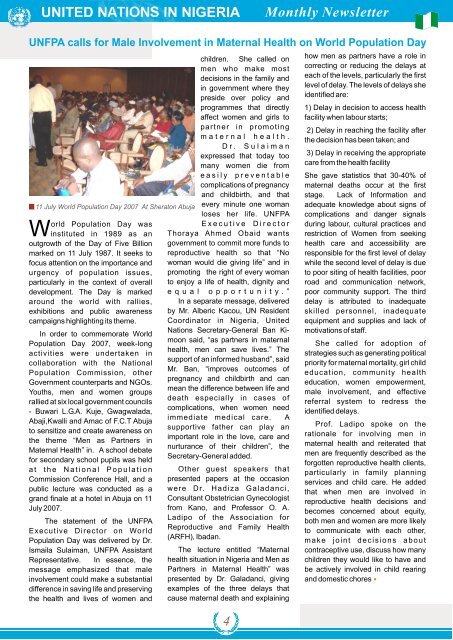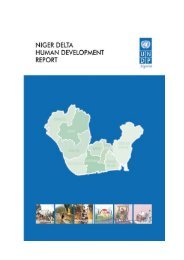UN july newsletter pdf convert2.cdr - UNDP Nigeria - United Nations ...
UN july newsletter pdf convert2.cdr - UNDP Nigeria - United Nations ...
UN july newsletter pdf convert2.cdr - UNDP Nigeria - United Nations ...
You also want an ePaper? Increase the reach of your titles
YUMPU automatically turns print PDFs into web optimized ePapers that Google loves.
<strong>UN</strong>ITED NATIONS IN NIGERIAMonthly Newsletter<strong>UN</strong>FPA calls for Male Involvement in Maternal Health on World Population Day11 July World Population Day 2007 At Sheraton Abujaorld Population Day wasWinstituted in 1989 as anoutgrowth of the Day of Five Billionmarked on 11 July 1987. It seeks tofocus attention on the importance andurgency of population issues,particularly in the context of overalldevelopment. The Day is markedaround the world with rallies,exhibitions and public awarenesscampaigns highlighting its theme.In order to commemorate WorldPopulation Day 2007, week-longactivities were undertaken incollaboration with the NationalPopulation Commission, otherGovernment counterparts and NGOs.Youths, men and women groupsrallied at six local government councils- Buwari L.G.A. Kuje, Gwagwalada,Abaji,Kwalli and Amac of F.C.T Abujato sensitize and create awareness onthe theme “Men as Partners inMaternal Health” in. A school debatefor secondary school pupils was heldat the National PopulationCommission Conference Hall, and apublic lecture was conducted as agrand finale at a hotel in Abuja on 11July 2007.The statement of the <strong>UN</strong>FPAExecutive Director on WorldPopulation Day was delivered by Dr.Ismaila Sulaiman, <strong>UN</strong>FPA AssistantRepresentative. In essence, themessage emphasized that maleinvolvement could make a substantialdifference in saving life and preservingthe health and lives of women andchildren. She called onmen who make mostdecisions in the family andin government where theypreside over policy andprogrammes that directlyaffect women and girls topartner in promotingmaternal health.Dr. Sulaimanexpressed that today toomany women die fromeasily preventablecomplications of pregnancyand childbirth, and thatevery minute one womanloses her life. <strong>UN</strong>FPAExecutive DirectorThoraya Ahmed Obaid wantsgovernment to commit more funds toreproductive health so that “Nowoman would die giving life” and inpromoting the right of every womanto enjoy a life of health, dignity andequal opportunity.”In a separate message, deliveredby Mr. Alberic Kacou, <strong>UN</strong> ResidentCoordinator in <strong>Nigeria</strong>, <strong>United</strong><strong>Nations</strong> Secretary-General Ban Kimoonsaid, “as partners in maternalhealth, men can save lives.” Thesupport of an informed husband”, saidMr. Ban, “improves outcomes ofpregnancy and childbirth and canmean the difference between life anddeath especially in cases ofcomplications, when women needimmediate medical care. Asupportive father can play animportant role in the love, care andnurturance of their children”, theSecretary-General added.Other guest speakers thatpresented papers at the occasionwere Dr. Hadiza Galadanci,Consultant Obstetrician Gynecologistfrom Kano, and Professor O. A.Ladipo of the Association forReproductive and Family Health(ARFH), Ibadan.The lecture entitled “Maternalhealth situation in <strong>Nigeria</strong> and Men asPartners in Maternal Health” waspresented by Dr. Galadanci, givingexamples of the three delays thatcause maternal death and explaininghow men as partners have a role incorrecting or reducing the delays ateach of the levels, particularly the firstlevel of delay. The levels of delays sheidentified are:1) Delay in decision to access healthfacility when labour starts;2) Delay in reaching the facility afterthe decision has been taken; and3) Delay in receiving the appropriatecare from the health facilityShe gave statistics that 30-40% ofmaternal deaths occur at the firststage. Lack of Information andadequate knowledge about signs ofcomplications and danger signalsduring labour, cultural practices andrestriction of Women from seekinghealth care and accessibility areresponsible for the first level of delaywhile the second level of delay is dueto poor siting of health facilities, poorroad and communication network,poor community support. The thirddelay is attributed to inadequateskilled personnel, inadequateequipment and supplies and lack ofmotivations of staff.She called for adoption ofstrategies such as generating politicalpriority for maternal mortality, girl childeducation, community healtheducation, women empowerment,male involvement, and effectivereferral system to redress theidentified delays.Prof. Ladipo spoke on therationale for involving men inmaternal health and reiterated thatmen are frequently described as theforgotten reproductive health clients,particularly in family planningservices and child care. He addedthat when men are involved inreproductive health decisions andbecomes concerned about equity,both men and women are more likelyto communicate with each other,make joint decisions aboutcontraceptive use, discuss how manychildren they would like to have andbe actively involved in child rearingand domestic chores4










